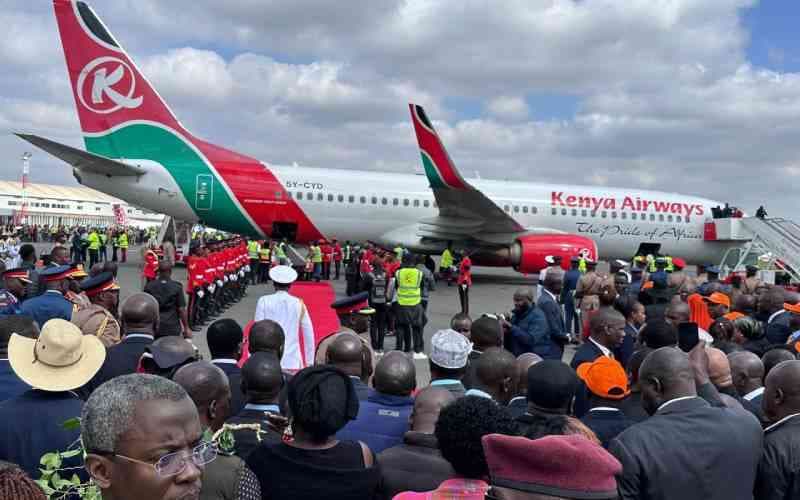We're loading the full news article for you. This includes the article content, images, author information, and related articles.
A massive security lapse at Jomo Kenyatta International Airport (JKIA) saw thousands of mourners breach restricted areas during the repatriation of former Prime Minister Raila Odinga's body, leading to a temporary suspension of all airport operations

Jomo Kenyatta International Airport (JKIA) experienced a significant security breach on Thursday, October 16, 2025, when large crowds of mourners and boda boda riders forced their way into restricted areas, including the State Pavilion and the tarmac, during the arrival of the body of former Prime Minister Raila Odinga. The unexpected surge of emotional supporters overwhelmed security personnel, disrupting the planned official reception ceremony and leading to a temporary shutdown of the airport.
The Kenya Airways charter flight, designated RAO001 in honour of the late leader, landed at approximately 9:30 AM EAT. President William Ruto, former President Uhuru Kenyatta, Deputy President Prof. Kithure Kindiki, and close family members were present at the State Pavilion to receive the casket. However, moments after the plane taxied to the VIP area, crowds broke through security barriers, forcing military and police officers to intervene. The disruption prevented the planned prayers and handover ceremony from taking place, leading to the cancellation of the entire official programme.
In response to the breach, the Kenya Civil Aviation Authority (KCAA) and the Kenya Airports Authority (KAA) announced a temporary suspension of all operations at JKIA. KCAA Director General Emile Arao stated that the two-hour suspension was a precautionary measure to allow security teams to restore order and ensure safety. The airspace over JKIA was closed from 10:26 AM to 12:26 PM EAT, with a Notice to Airmen (NOTAM) issued to alert aviation stakeholders. At least seven flights were diverted to other airports during this period.
KAA Acting Managing Director and CEO Mohamud Gedi emphasised that the safety and security of passengers, staff, and all airport users remained the highest priority. Normal operations at JKIA resumed later on Thursday, October 16, 2025, after the security situation was resolved and the airport declared safe.
Raila Odinga, who passed away on Wednesday, October 15, 2025, at the age of 80 in Kochi, Kerala, India, after suffering a cardiac arrest, was a towering figure in Kenyan politics for over four decades. His passing has elicited widespread national mourning and global tributes. The overwhelming turnout at JKIA underscores the deep emotional connection many Kenyans had with the veteran opposition leader. The government declared Friday, October 17, 2025, a public holiday in his honour, with a State Funeral Service planned at Nyayo Stadium.
Kenya's aviation security framework is governed by both international and national laws and regulations, with the Kenya Civil Aviation Authority (KCAA) serving as the primary regulatory body. The KCAA, in collaboration with the Kenya Airports Authority (KAA) and various security agencies, is responsible for implementing and overseeing security procedures at airports. These measures include multiple security checkpoints, vehicle inspections, baggage screening, CCTV surveillance, and regular patrols.
Kenya is a signatory to the International Civil Aviation Organization (ICAO) Chicago Convention, and its aviation security standards are aligned with ICAO Annex 17, which outlines international standards and recommended practices for aviation security. The Civil Aviation Act empowers the KCAA to set regulations concerning airport security, including screening procedures for passengers, baggage, and cargo. The KCAA is also in the process of amending the Civil Aviation (Security) Regulations, 2020, to incorporate new requirements from Amendment 18 of Annex 17.
The incident at JKIA highlighted the challenges of managing large, emotional crowds in sensitive security zones. Security forces, including military personnel and General Service Unit (GSU) officers, were visibly overwhelmed by the sheer number of mourners. KAA Acting Managing Director Mohamud Gedi expressed regret for the inconvenience caused to travellers but affirmed the necessity of the temporary closure to uphold national security and aviation safety.
The security breach at JKIA raises serious questions about the efficacy of existing crowd control measures and emergency response protocols at critical national infrastructure points. Such incidents can have significant implications for Kenya's international aviation standing and passenger confidence. While normal operations have resumed, a thorough review of the security lapse is anticipated to prevent future occurrences and reinforce the airport's security posture.
Key questions remain regarding how such a large number of individuals managed to bypass multiple layers of security to access restricted areas. The extent of any damage to airport infrastructure or potential compromise of sensitive areas is yet to be fully detailed. Investigations are expected to shed light on the specific vulnerabilities exploited and accountability for the security lapse.
Authorities are expected to conduct a comprehensive investigation into the security breach at JKIA. The findings of this investigation will be crucial in informing revised security protocols and crowd management strategies for future high-profile events. The KCAA's ongoing efforts to amend the Civil Aviation (Security) Regulations, 2020, may also gain renewed urgency in light of this incident.
Keep the conversation in one place—threads here stay linked to the story and in the forums.
Sign in to start a discussion
Start a conversation about this story and keep it linked here.
Other hot threads
E-sports and Gaming Community in Kenya
Active 9 months ago
The Role of Technology in Modern Agriculture (AgriTech)
Active 9 months ago
Popular Recreational Activities Across Counties
Active 9 months ago
Investing in Youth Sports Development Programs
Active 9 months ago
Key figures and persons of interest featured in this article